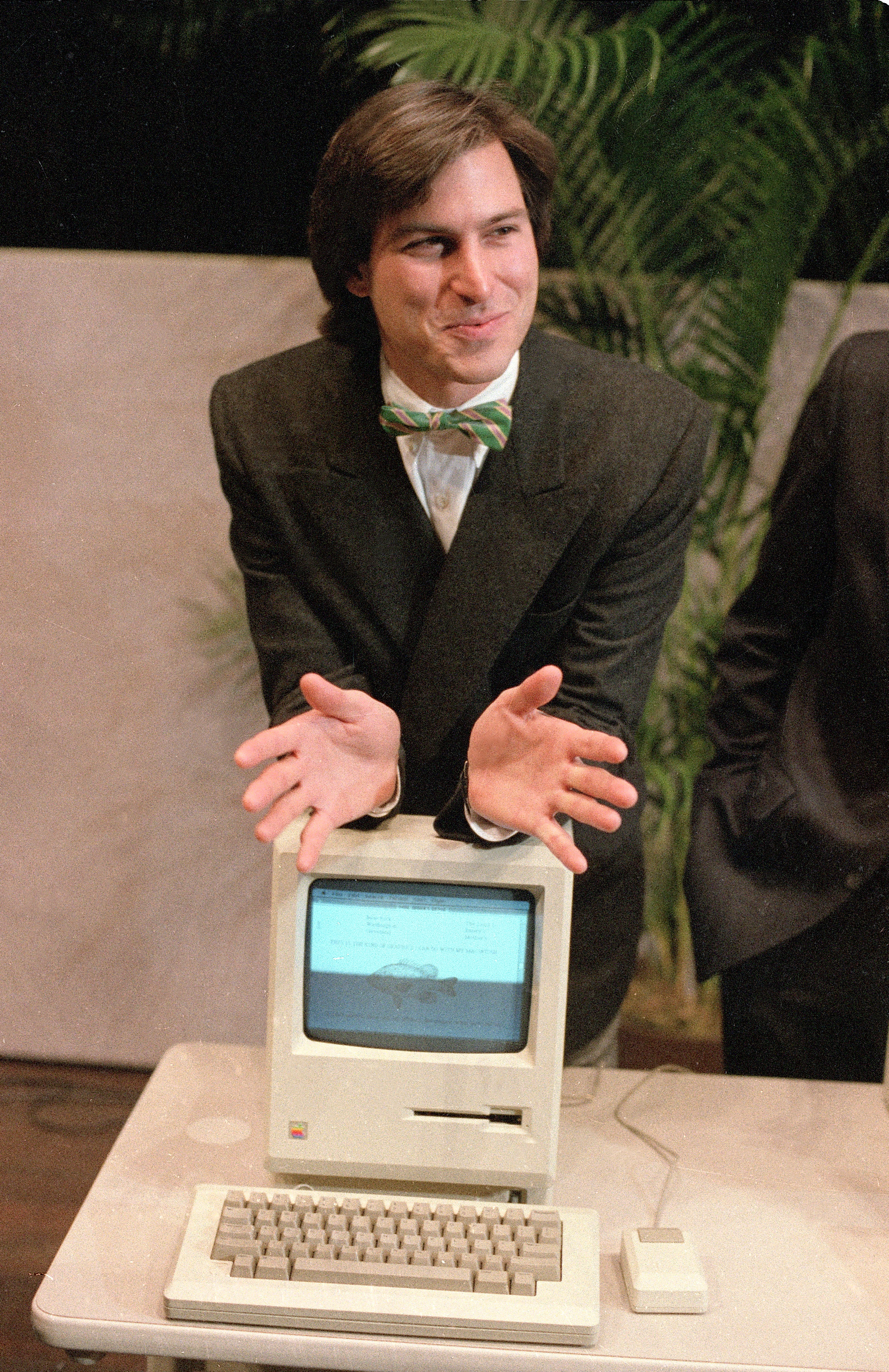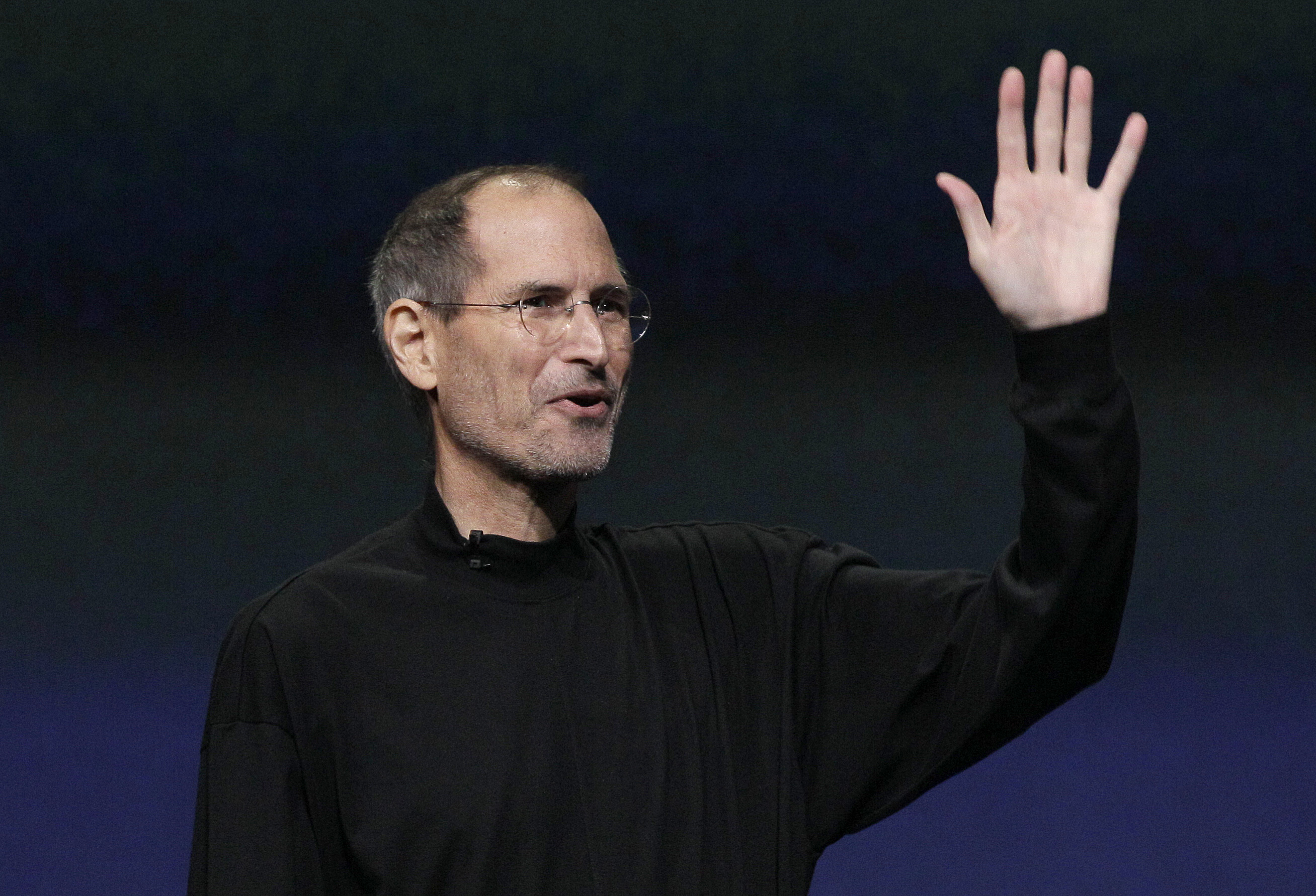Steve Jobs, Apple CEO and creative force, resigns
Thursday, August 25, 2011
 In this Jan. 24, 1984 file photo, Steven Jobs, chairman of the board of Apple Computer, leans on the new Macintosh personal computer following a shareholder's meeting in Cupertino, Ca. Apple Inc. on Wednesday, Aug. 24, 2011 said Jobs is resigning as CEO, effective immediately. He will be replaced by Tim Cook, who was the company's chief operating officer. It said Jobs has been elected as Apple's chairman. (AP Photo/Paul Sakuma, File)
In this Jan. 24, 1984 file photo, Steven Jobs, chairman of the board of Apple Computer, leans on the new Macintosh personal computer following a shareholder's meeting in Cupertino, Ca. Apple Inc. on Wednesday, Aug. 24, 2011 said Jobs is resigning as CEO, effective immediately. He will be replaced by Tim Cook, who was the company's chief operating officer. It said Jobs has been elected as Apple's chairman. (AP Photo/Paul Sakuma, File)JORDAN ROBERTSON, AP Technology Writer
RACHEL METZ, AP Technology Writer
SAN FRANCISCO - The man in the black shirt and jeans who knew people would fall in love with the iPod, iPhone and iPad before they did is stepping back from Apple Inc., which grew into one of the world's strongest companies as its leader's health failed him.
Steve Jobs' resignation Wednesday appears to be the result of an unspecified medical condition for which he took a leave from his post in January. Apple's chief operating officer, Tim Cook, was quickly named CEO of the company Jobs co-founded in his garage 35 years ago.
In a letter addressed to Apple's board and the "Apple community," Jobs said he "always said if there ever came a day when I could no longer meet my duties and expectations as Apple's CEO, I would be the first to let you know. Unfortunately, that day has come."
The company said Jobs gave the board his resignation Wednesday and suggested Cook be named the company's new leader. Apple said Jobs was elected board chairman and Cook is becoming a member of its board.
Genentech Inc. Chairman Art Levinson, in a statement issued on behalf of Apple's board, said Jobs' "extraordinary vision and leadership saved Apple and guided it to its position as the world's most innovative and valuable technology company."
He said that Jobs will continue to provide "his unique insights, creativity and inspiration," and that the board has "complete confidence" that Cook is the right person to replace him.
""Tim's 13 years of service to Apple have been marked by outstanding performance, and he has demonstrated remarkable talent and sound judgment in everything he does," Levinson said.
Jobs' health has long been a concern for Apple investors who see him as an oracle of technology. After his announcement, Apple stock quickly fell 5.4 percent in after-hours trading.
Jeff Gamet, managing editor of The Mac Observer online news site focused on Apple, said Jobs' departure has more sentimental than practical significance, and that he has been telegraphing the change for several years.
"All Apple really has done is made official what they've been doing administratively for a while now, which is Tim runs the show and Steve gets to do his part to make sure the products come out to meet the Apple standard," he said.
"I expect that even though there are a lot of people that right now are sad or scared because Steve is stepping back from the CEO role, that ultimately they'll be OK," Gamet said.
But Trip Chowdhry, an analyst with Global Equities Research, said Jobs' maniacal attention to detail is what set Apple apart. He said Apple's product pipeline might be secure for another few years, but predicted that the company will eventually struggle to come up with market-changing ideas.
"Apple is Steve Jobs, Steve Jobs is Apple, and Steve Jobs is innovation," Chowdhry said. "You can teach people how to be operationally efficient, you can hire consultants to tell you how to do that, but God creates innovation. ... Apple without Steve Jobs is nothing."
Earlier this month Apple became the most valuable company in America, briefly surpassing Exxon Mobil. At the market close Wednesday its market value was $349 billion, just behind Exxon Mobil's $358 billion.
Jobs' hits seemed to grow bigger as the years went on: After the colorful iMac computer and the now-ubiquitous iPod, the iPhone redefined the category of smart phones and the iPad all but created the market for tablet computers.
His own aura seemed part of the attraction. On stage at trade shows and company events in his uniform of jeans, sneakers and black mock-turtlenecks, he'd entrance audiences with new devices, new colors, new software features, building up to a grand finale he'd predictably preface by saying, "One more thing."
Jobs, 56, shepherded Apple from a two-man startup to Silicon Valley darling when the Apple II, the first computer for regular people to really catch on, sent IBM Corp. and others scrambling to get their own PCs to market.
After Apple suffered a slump in the mid-1980s, he was forced out of the company. He was CEO at Next, another computer company, and Pixar, the computer-animation company that produced "Toy Story" on his watch, over the following 10 years.
Apple was foundering as he returned as an adviser in 1996 - a year it lost $900 million as Microsoft Windows-based PCs dominated the computer market. The company's fortunes began to turn around with its first new product under Jobs' direction, the iMac, which launched in 1998 and sold about 2 million in its first 12 months.
Jobs eventually became interim CEO, then took the job permanently. Apple's popularity grew in the U.S. throughout the 2000s as the ever-sleeker line of iPods introduced many lifelong Windows users to their first Apple gadget. Apple created another sensation in 2007 with the iPhone, the stark-looking but powerful smart phone that quickly dominated the industry.
The iPad was introduced less than a year and a half ago but has already sold nearly 29 million units as it inspired myriad rivals in a tablet computer market that scarcely existed before Apple stepped in.
There have been some setbacks. Apple was swept up in a massive Securities and Exchange Commission inquiry into stock options backdating in the mid-2000s, a practice that artificially boosted the value of options grants. But Jobs and Apple emerged unscathed after two former executives took the fall and eventually settled with the SEC.
As Jobs was praised for his vision, concerns about his health persisted. The January leave was Jobs' third medical leave over several years. He had previously survived pancreatic cancer and received a liver transplant.
Shannon Cross, an analyst at Cross Research, said Cook is a good choice to replace Jobs.
"He has taken over for Jobs twice in two medical leaves and the company has functioned extremely well," she said, adding that Cook has been Jobs' "right hand guy" for many years.
Cross also said Jobs put in place a "culture of innovation" that will help Apple remain a creative force in the industry.
"Steve Jobs is an extremely strong leader and clearly has made Apple a leading consumer electronics company and one of the most innovative companies in the world," she said. "However, he didn't do it alone."
AP Technology Writer Barbara Ortutay in San Francisco contributed to this report.
10 products that defined Steve Jobs' career
NEW YORK - Steve Jobs had no formal schooling in engineering, yet he's listed as the inventor or co-inventor on more than 200 U.S. patents. These are some of the significant products that were created under his direction:
1. Apple I (1976) - Apple's first product was a computer for hobbyists and engineers, made in small numbers. Steve Wozniak designed it, while Jobs orchestrated the funding and handled the marketing.
2. Apple II (1977) - One of the first successful personal computers, the Apple II was designed as a mass-market product rather than something for engineers or enthusiasts. It was still largely Wozniak's design. Several upgrades for the model followed, and the product line continued until 1993.
3. Lisa (1983) - Jobs' visit to Xerox Corp.'s research center in Palo Alto inspired him to start work on the first commercial computer with a graphical user interface, with icons, windows and a cursor controlled by a mouse. It was the foundation for today's computer interfaces, but the Lisa was too expensive to be a commercial success.
4. Macintosh (1984) - Like the Lisa, the Macintosh had a graphical user interface. It was also cheaper and faster and had the backing of a large advertising campaign behind it. People soon realized how useful the graphical interface was for design. That led "desktop publishing," accomplished with a Mac coupled to a laser printer, to soon become a sales driver.
5. NeXT computer (1989) - After being forced out of Apple, Jobs started a company that built a powerful workstation computer. The company was never able to sell large numbers, but the computer was influential: The world's first Web browser was created on one. Its software also lives on as the basis for today's Macintosh and iPhone operating system.
6. iMac (1998) - When Jobs returned to Apple in 1996, the company was foundering, with an ever shrinking share of the PC market. The radical iMac was the first step in reversing the slide. It was strikingly designed as a bubble of blue plastic that enclosed both the monitor and the computer. Easy to set up, it captured the imagination just as people across the world were having their eyes opened to the benefits of the Internet and considering getting their first home computer.
7. iPod (2001) - It wasn't the first digital music player with a hard drive, but it was the first successful one. Apple's expansion into portable electronics has had vast ramifications. The iPod's success prepared the way for the iTunes music store and the iPhone.
8. iTunes store (2003) - Before the iTunes store, buying digital music was a hassle, making piracy the more popular option. The store simplified the process and brought together tracks from all the major labels. The store became the largest music retailer in the U.S. in 2008.
9. iPhone (2007) - The iPhone did for the phone experience what the Macintosh did for personal computing - it made the power of a smartphone easy to harness. Apple is now the world's most profitable maker of phones, and the influence of the iPhone is evident in all smartphones.
10. iPad (2010) - Dozens of companies, including Apple, had created tablet computers before the iPad, but none caught on. The iPad finally cracked the code, creating a whole new category of computer practically by itself.

